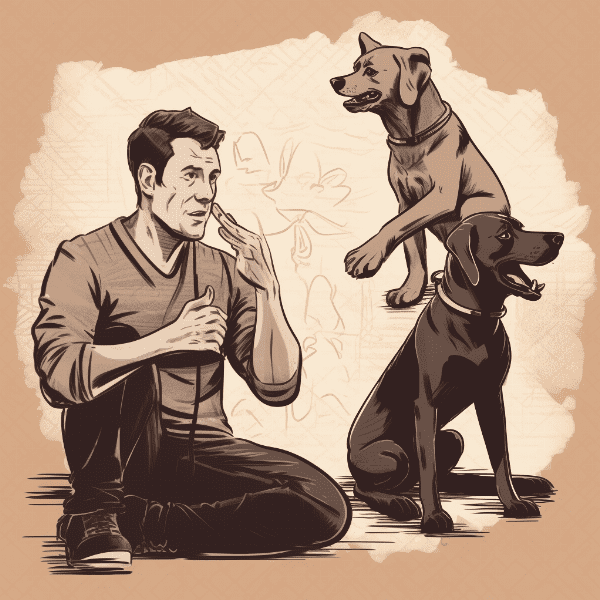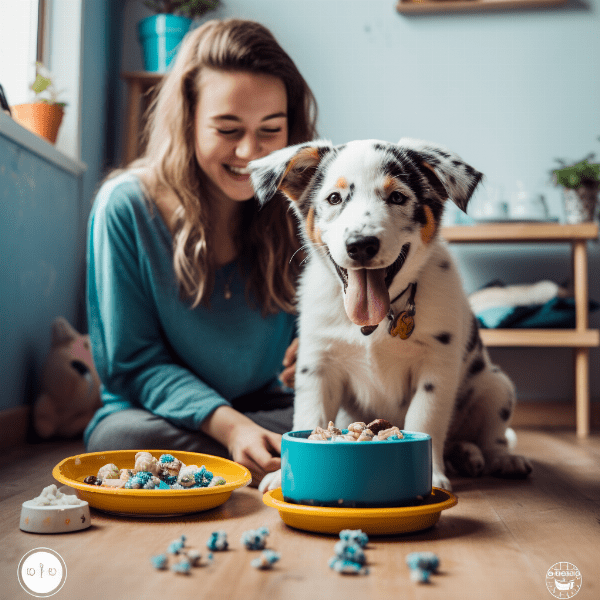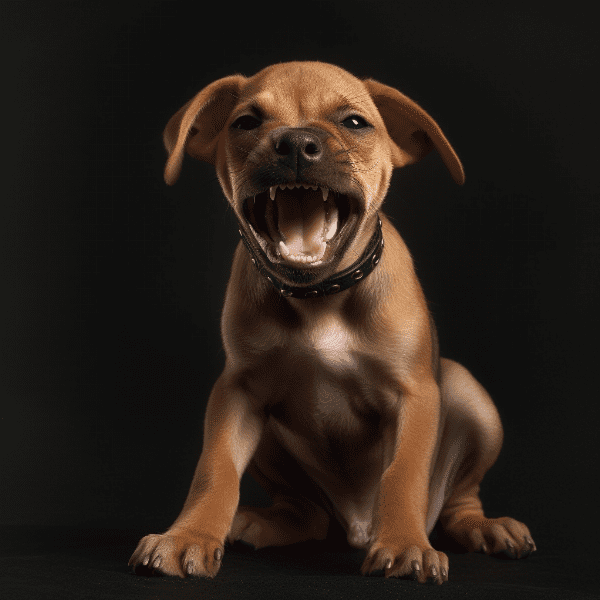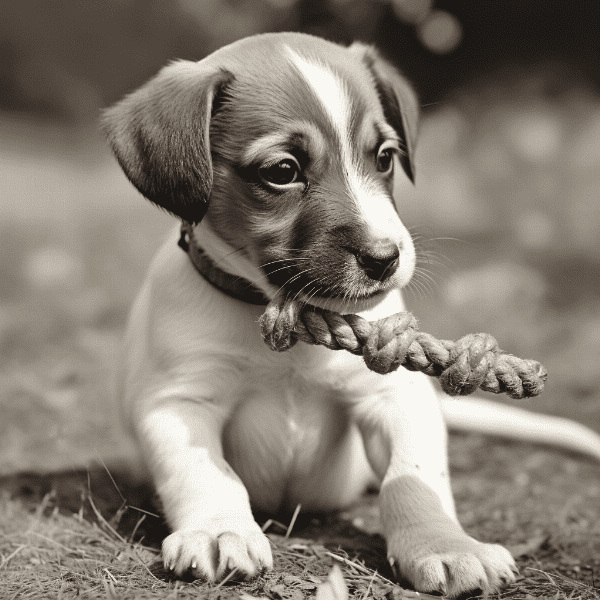Table of Contents
- Understanding Aggressive Puppy Behavior
- Common Reasons Why Puppies Bite
- How Biting Can Be a Form of Play
- The Importance of Puppy Socialization
- Techniques to Stop Aggressive Biting
- Training Methods for Biting Prevention
- Redirecting Your Puppy’s Chewing Habits
- Consistency in Disciplining Your Puppy
- Positive Reinforcement Techniques
- When to Seek Professional Help for Your Aggressive Puppy
Understanding Aggressive Puppy Behavior
Puppies are known for their playful and energetic nature. However, sometimes they can exhibit aggressive behavior, including biting. Understanding why your puppy is behaving aggressively is essential to correct the issue effectively.
The Importance of Early Socialization
Puppies that lack proper socialization are more likely to develop aggressive behavior. Socialization exposes your puppy to new people, animals, and experiences, which can help prevent fear and anxiety. Without proper socialization, puppies can become overwhelmed, leading to fear-based aggression.
The Role of Teething
Puppies also bite as a way to alleviate the discomfort associated with teething. It’s essential to provide your puppy with plenty of chew toys and bones to help redirect their biting behavior. However, it’s crucial to note that aggressive biting and teething biting are not the same things.
Behavioral Issues
Sometimes aggressive puppy behavior can be a result of underlying behavioral issues. Separation anxiety, fear, and dominance issues can all manifest in biting behavior. Identifying the root cause of the aggression is key to preventing and correcting it.
Aggression Vs. Playful Biting
It’s important to differentiate between playful biting and aggressive biting. Playful biting is a natural behavior for puppies, and it often occurs during playtime. Aggressive biting, on the other hand, is an intentional act that can cause harm to others. If your puppy is exhibiting aggressive biting behavior, it’s important to address it immediately.
By understanding why your puppy is biting, you can take the necessary steps to correct their behavior. Whether it’s through socialization, teething relief, or addressing underlying behavioral issues, your puppy can learn appropriate behavior and become a well-behaved and loving companion.

Common Reasons Why Puppies Bite
Puppy biting is a common behavior that is often misunderstood. Many owners mistake playful biting for aggression, leading to confusion and frustration. Here are some of the most common reasons why puppies bite.
Teething
As mentioned earlier, teething is a natural part of a puppy’s development, and it can cause discomfort and pain. To alleviate the pain, puppies will often chew and bite on anything they can get their teeth on, including their owners. It’s important to provide your puppy with appropriate chew toys and bones to redirect their biting behavior.
Exploration
Puppies explore their environment with their mouth, and this often involves biting. As they explore, they learn about the world around them and develop their senses. However, it’s essential to teach them what is appropriate to bite and what isn’t.
Playful Behavior
Puppies often engage in play biting as a way to communicate and socialize with their owners and other animals. Play biting is usually gentle and accompanied by tail wagging, and it is not intended to cause harm.
Attention Seeking
Some puppies may bite as a way to get attention from their owners. If a puppy has learned that biting leads to attention, they may continue the behavior. It’s important to teach your puppy appropriate ways to seek attention, such as sitting or laying down.
.
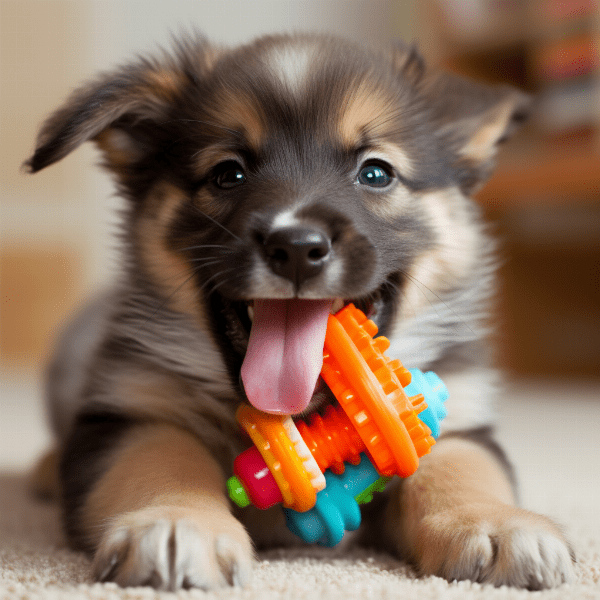
How Biting Can Be a Form of Play
Many puppies engage in biting behavior as a form of play. While this behavior can be frustrating and painful for owners, it is a natural part of a puppy’s development. Understanding why your puppy is biting and how to redirect their behavior is key to preventing aggression.
Socialization
Puppies learn social skills and boundaries through play, and biting is a part of this learning process. Playful biting is often accompanied by tail wagging, and it’s important to distinguish it from aggressive biting. By allowing your puppy to socialize and play with other dogs, they can learn how to play without causing harm.
Learning Bite Inhibition
Bite inhibition is the ability for a dog to control the force of their bite. Puppies learn bite inhibition through play with their littermates and mother. If a puppy bites too hard during play, their littermate will often yelp and stop playing, teaching the puppy that biting too hard is not acceptable.
Bonding and Trust
Play biting can also be a way for puppies to bond with their owners and build trust. Through play, they learn that their owner is a source of fun and enjoyment, and this can strengthen the bond between the two.
Redirecting Biting Behavior
It’s important to redirect your puppy’s biting behavior to appropriate toys and objects. Providing them with chew toys and bones can help redirect their biting behavior and satisfy their need to chew. It’s also important to discourage biting during playtime by stopping play and redirecting their attention when they become too rough.
By understanding how biting can be a form of play, owners can learn how to redirect this behavior and teach their puppy appropriate playtime behavior. With patience and consistency, your puppy can learn how to play without causing harm and become a well-behaved and loving companion.

The Importance of Puppy Socialization
Socialization is a crucial aspect of raising a well-behaved and happy puppy. Socialization refers to exposing your puppy to various experiences, people, and animals, so they learn how to interact with the world around them. Proper socialization can help prevent fear, anxiety, and aggression in puppies.
Prevention of Fear and Anxiety
Puppies that lack socialization may develop fear and anxiety towards new people, animals, and experiences. Fear-based aggression is a common issue in dogs, and it can be prevented through proper socialization. By exposing your puppy to various experiences and situations, you can help them become more confident and less fearful.
Development of Social Skills
Socialization helps puppies develop their social skills and learn appropriate behavior when interacting with other dogs and people. By socializing with other puppies and dogs, they can learn how to play and interact without causing harm. They can also learn how to communicate with other dogs effectively.
Prevention of Aggression
Proper socialization can help prevent aggression in puppies. Aggression is often a result of fear and anxiety, and socialization can help reduce these negative emotions. By exposing your puppy to various experiences and people, they can learn how to interact with others in a positive and non-threatening manner.
Timing of Socialization
The critical period for puppy socialization is between 3 and 14 weeks of age. During this time, puppies are most receptive to new experiences and can learn quickly. It’s important to expose your puppy to various experiences during this critical period to maximize their socialization.
Methods of Socialization
Socialization can occur in various ways, including puppy classes, playdates, and walks in different environments. It’s important to expose your puppy to various experiences in a controlled and safe manner, so they don’t become overwhelmed or frightened.
By understanding the importance of socialization, owners can help prevent fear, anxiety, and aggression in their puppies. By exposing them to various experiences and people, they can learn how to interact with the world around them positively. With proper socialization, your puppy can become a well-behaved and happy companion.
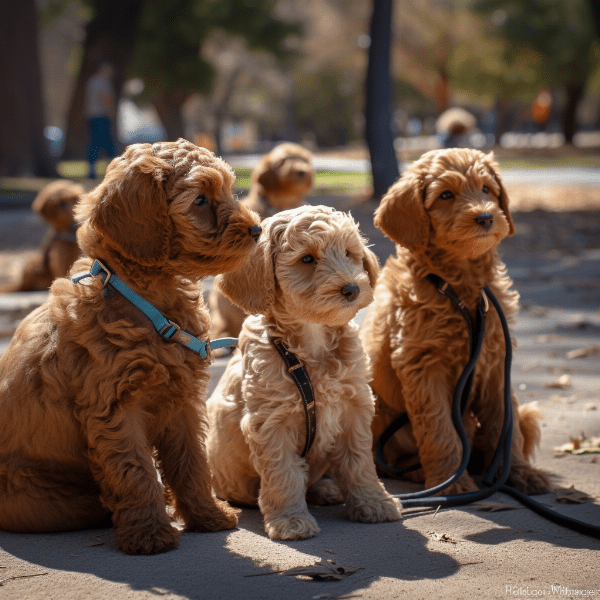
Techniques to Stop Aggressive Biting
Aggressive biting is a serious issue that needs to be addressed immediately. If left unchecked, it can lead to injury and behavioral issues. Here are some techniques to stop aggressive biting in puppies.
Use Distractions
Distractions can be an effective way to redirect your puppy’s biting behavior. If your puppy starts biting you, redirect their attention to a toy or bone. This will teach them that biting is not acceptable behavior and provide them with a positive outlet for their chewing needs.
Use Timeouts
Timeouts can be an effective way to discourage aggressive biting behavior. If your puppy bites you, say “ouch” loudly and then immediately leave the room for a few minutes. This will teach your puppy that biting leads to the end of playtime and can help them learn that biting is not acceptable behavior.
Consistency is Key
Consistency is crucial when addressing aggressive biting behavior. It’s important to apply these techniques consistently and not allow any biting behavior, even if it seems playful. By setting clear boundaries, your puppy will learn what is acceptable behavior and what is not.
Seek Professional Help
By using positive reinforcement, distractions, and timeouts, and being consistent, owners can teach their puppies appropriate behavior and prevent aggressive biting. Remember, with patience and persistence, your puppy can learn to be a well-behaved and loving companion.
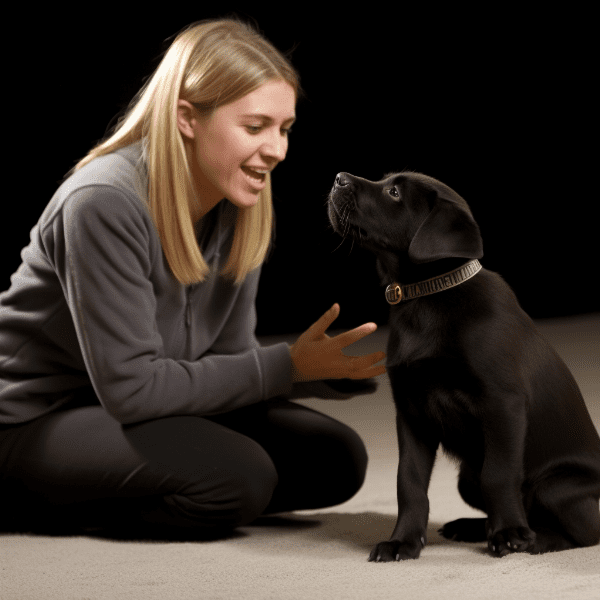
Training Methods for Biting Prevention
Preventing biting behavior in puppies requires consistent training and patience. Here are some effective training methods for preventing biting behavior.
Teaching Basic Commands
Teaching your puppy basic commands, such as “sit” and “stay,” can help prevent biting behavior. By giving your puppy clear commands and rewarding them for following through, they can learn to respect you as their owner and understand what behavior is expected of them.
Bite Inhibition Training
Bite inhibition training teaches your puppy to control the force of their bite. This training involves teaching your puppy to bite gently and not apply too much pressure. When your puppy bites too hard, yelp loudly and stop playing. This will teach your puppy that biting too hard is not acceptable behavior.
Redirection Training
Redirection training involves redirecting your puppy’s biting behavior to appropriate toys and objects. When your puppy starts biting you, immediately redirect their attention to a chew toy or bone. This will teach them what is appropriate to bite and what isn’t.
Socialization Training
Socialization training involves exposing your puppy to various experiences, people, and animals. By socializing your puppy at an early age, they can learn appropriate behavior when interacting with others. This can help prevent fear-based aggression and biting behavior.
Consistency and Patience
Consistency and patience are crucial when training your puppy to prevent biting behavior. It’s important to be consistent with your commands and training techniques and not allow any biting behavior. With patience and persistence, your puppy can learn appropriate behavior and become a well-behaved companion.
By using basic commands, bite inhibition training, redirection training, socialization training, and being consistent and patient, owners can effectively prevent biting behavior in puppies. Remember, with proper training and socialization, your puppy can learn to be a loving and well-behaved companion.
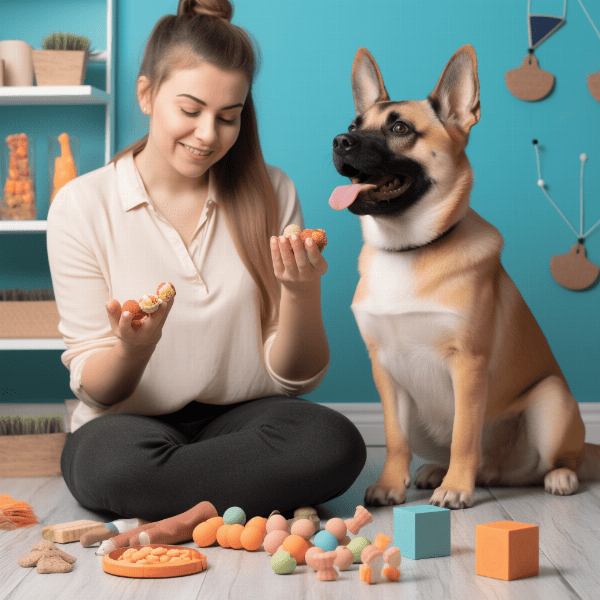
Redirecting Your Puppy’s Chewing Habits
Redirecting your puppy’s chewing habits is an effective way to prevent biting behavior. Here are some techniques to redirect your puppy’s chewing habits.
Provide Appropriate Chew Toys
Providing your puppy with appropriate chew toys is crucial to redirect their chewing habits. Chew toys should be durable, non-toxic, and safe for your puppy to chew. By providing your puppy with chew toys, you can redirect their chewing behavior to appropriate objects.
Keep Objects Out of Reach
To prevent your puppy from chewing on inappropriate objects, it’s essential to keep them out of reach. Keep shoes, clothing, and other valuable objects in a place where your puppy can’t reach them. This will help prevent your puppy from developing a habit of chewing on inappropriate objects.
Supervise Your Puppy
Supervising your puppy is crucial to redirect their chewing behavior. When your puppy starts to chew on an inappropriate object, redirect their attention to a chew toy or bone. By supervising your puppy, you can catch inappropriate chewing behavior and redirect it to appropriate objects.
Use Deterrent Sprays
Deterrent sprays can be an effective way to redirect your puppy’s chewing behavior. These sprays are designed to taste bitter, making objects unappealing to your puppy. Use these sprays on inappropriate objects to discourage your puppy from chewing on them.
Be Consistent
Consistency is key when redirecting your puppy’s chewing behavior. It’s important to be consistent with the objects you allow your puppy to chew on and those you don’t. With consistency, your puppy will learn what is appropriate to chew and what isn’t.
By providing appropriate chew toys, keeping objects out of reach, supervising your puppy, using deterrent sprays, and being consistent, owners can effectively redirect their puppy’s chewing habits. Remember, with patience and persistence, your puppy can learn appropriate behavior and become a well-behaved and loving companion.
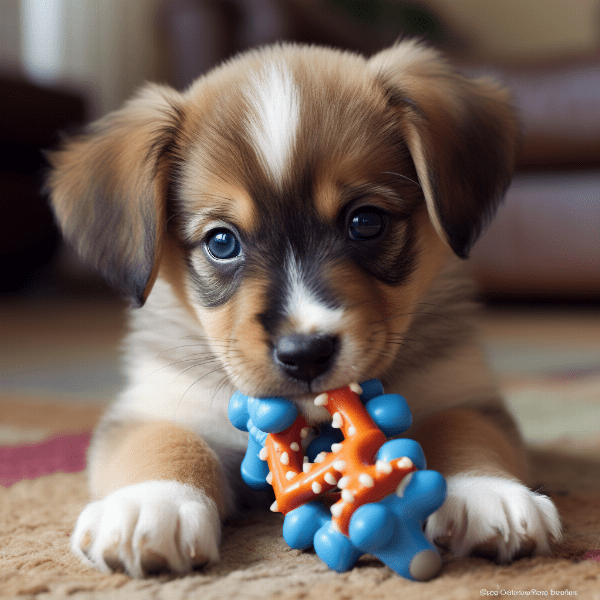
Consistency in Disciplining Your Puppy
Consistency in disciplining your puppy is crucial to prevent biting behavior and other undesirable behaviors. Here are some tips for maintaining consistency in disciplining your puppy.
Set Clear Boundaries
Setting clear boundaries is essential when disciplining your puppy. Establish rules and stick to them consistently. This will help your puppy understand what is expected of them and prevent confusion.
Use Positive Reinforcement
Positive reinforcement is a powerful tool when disciplining your puppy. Reward your puppy for good behavior with treats, toys, and praise. This will encourage them to continue the desired behavior and prevent unwanted behavior.
Avoid Physical Punishment
Physical punishment is not an effective way to discipline your puppy. It can lead to fear and aggression and damage your relationship with your puppy. Instead, use positive reinforcement and redirection to address unwanted behavior.
Be Consistent with Commands
Consistency with commands is crucial when disciplining your puppy. Use the same commands consistently and make sure all family members are using the same commands. This will prevent confusion and reinforce positive behavior.
Redirect Unwanted Behavior
Redirecting unwanted behavior is an effective way to discipline your puppy. Instead of punishing your puppy, redirect their attention to appropriate toys and objects. This will teach them what is appropriate behavior and prevent undesirable behavior.
By setting clear boundaries, using positive reinforcement, avoiding physical punishment, being consistent with commands, and redirecting unwanted behavior, owners can effectively discipline their puppies and prevent unwanted behavior. Remember, with patience and consistency, your puppy can learn appropriate behavior and become a well-behaved and loving companion.
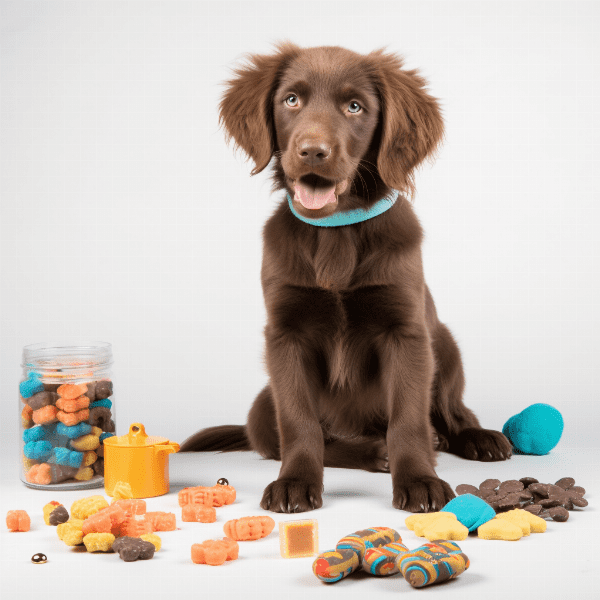
Positive Reinforcement Techniques
Positive reinforcement is a powerful training technique that can effectively prevent biting behavior and other undesirable behaviors. Here are some positive reinforcement techniques to use with your puppy.
Treats and Rewards
Treats and rewards are a common positive reinforcement technique. When your puppy exhibits desired behavior, reward them with treats, toys, or praise. This will encourage them to continue the positive behavior and prevent undesirable behavior.
Clicker Training
Clicker training is a form of positive reinforcement training that uses a clicking sound to signal good behavior. When your puppy exhibits desired behavior, click the clicker and give them a treat or praise. This will reinforce the positive behavior and encourage them to continue it.
Playtime
Playtime can be a powerful positive reinforcement technique. By engaging in playtime with your puppy, you can reinforce positive behavior and build a strong bond with your puppy. Use playtime as a reward for good behavior and a way to redirect undesirable behavior.
Verbal Praise
Verbal praise is a simple but effective positive reinforcement technique. When your puppy exhibits desired behavior, use verbal praise such as “good boy/girl” or “well done.” This will reinforce the positive behavior and encourage them to continue it.
Consistency
Consistency is crucial when using positive reinforcement techniques. It’s important to reward your puppy consistently for desired behavior and redirect undesirable behavior consistently. With consistency, your puppy will learn what behavior is expected of them and what behavior is not.
By using treats and rewards, clicker training, playtime, verbal praise, and being consistent, owners can effectively use positive reinforcement techniques to prevent biting behavior and other undesirable behaviors. Remember, with patience and persistence, your puppy can learn appropriate behavior and become a well-behaved and loving companion.
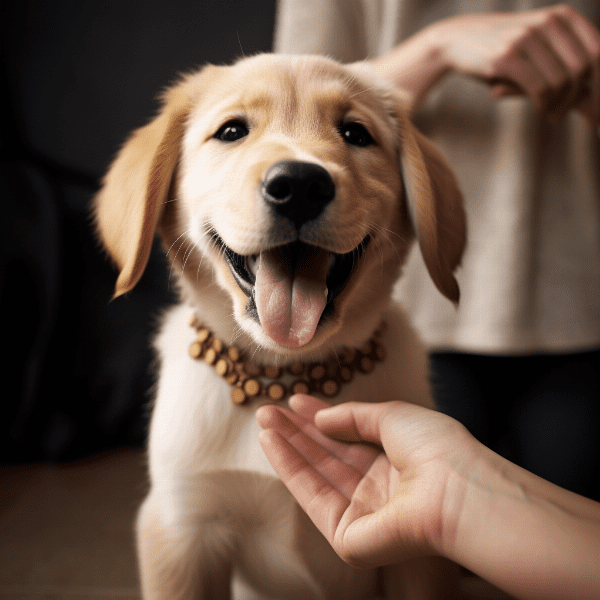
When to Seek Professional Help for Your Aggressive Puppy
If your puppy’s biting behavior is severe or persists despite your efforts to address it, it may be time to seek professional help. Here are some signs that indicate it’s time to seek professional help for your aggressive puppy.
Aggressive Behavior Toward Other Animals
If your puppy exhibits aggressive behavior toward other animals, it’s time to seek professional help. This behavior can lead to fights and injuries and needs to be addressed before it escalates.
Persistent Biting Behavior
If your puppy’s biting behavior persists despite your efforts to address it, it may be time to seek professional help. A professional dog trainer or behaviorist can assess your puppy’s behavior and provide you with tailored training techniques to address the issue effectively.
Fear and Anxiety
If your puppy exhibits fear and anxiety towards new experiences, people, and animals, it may be time to seek professional help. Fear-based aggression is a common issue in dogs and can be prevented through proper socialization and training.
Safety Concerns
If you feel unsafe or uncomfortable around your puppy due to their aggressive behavior, it’s time to seek professional help. Your safety and the safety of those around you should be a top priority.
By seeking professional help, owners can address their puppy’s aggressive behavior effectively and prevent injury and behavioral issues. Remember, with proper training and socialization, your puppy can learn appropriate behavior and become a well-behaved and loving companion.
